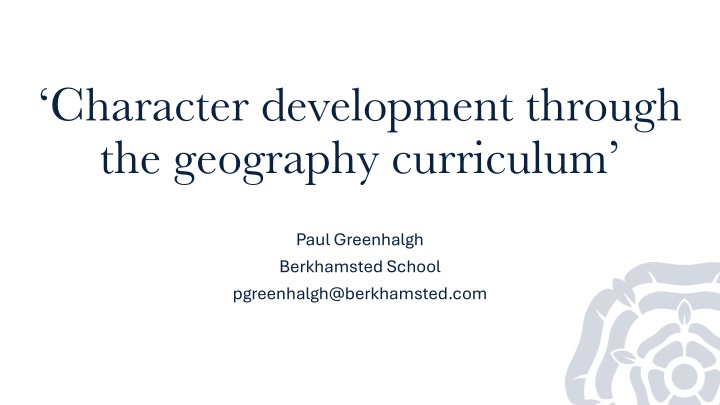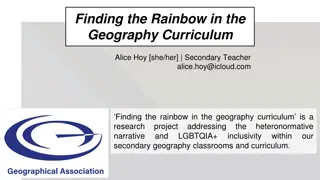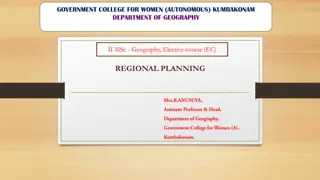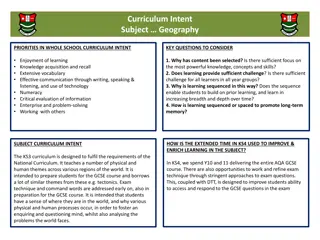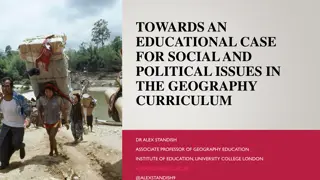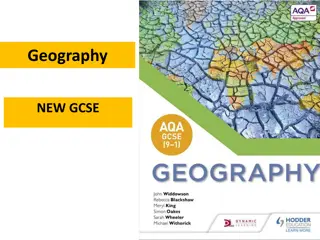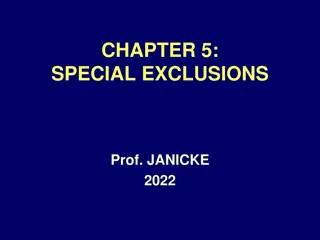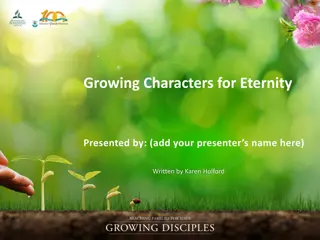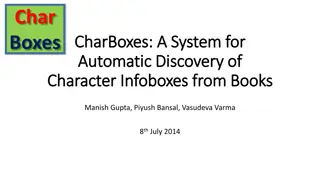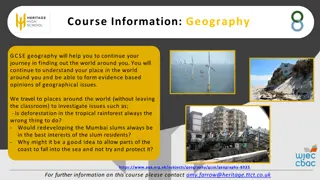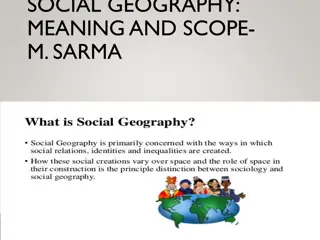Character Development Through Geography Curriculum: Enhancing Student Growth
Geography plays a crucial role in shaping student character by instilling moral and civic virtues, fostering a sense of responsibility towards global issues like climate change, and promoting reflective and compassionate learning experiences. Integrating character education into the geography curriculum enables students to understand their impact on the world and empowers them to make positive changes. This approach not only enriches education but also equips students to be agents of positive change in society.
Download Presentation

Please find below an Image/Link to download the presentation.
The content on the website is provided AS IS for your information and personal use only. It may not be sold, licensed, or shared on other websites without obtaining consent from the author.If you encounter any issues during the download, it is possible that the publisher has removed the file from their server.
You are allowed to download the files provided on this website for personal or commercial use, subject to the condition that they are used lawfully. All files are the property of their respective owners.
The content on the website is provided AS IS for your information and personal use only. It may not be sold, licensed, or shared on other websites without obtaining consent from the author.
E N D
Presentation Transcript
Character development through the geography curriculum Paul Greenhalgh Berkhamsted School pgreenhalgh@berkhamsted.com
(1) What is the place of geography for informing student character?
Arthur et al. (2015). Character Education in UK Schools: Research Report Aim to discover the state of play of character education. 68 schools across the UK. State, independent, faith-based, grammar, single-sex, co-ed, rural, urban. Surveys, moral dilemmas and semi-structured interviews. 10,000 students and 250 staff. Character educational not only desirable, but necessary.
White, M. (2018). A good education: a new model of learning to enrich every child. Character education is integral to the whole educational endeavour, taught through every lesson and lived through every hour (p. 54).
(2) How might a focus on character shape geography classroom practice?
Pedagogy and character education Moral virtue Motivation to respond to new knowledge and understanding. Civic virtue Making practical mitigatory responses to climate change. Equipping students to make a difference for good in the world, rather than just giving them a lens by which to see the world
Planning for curriculum character education Head Heart Opportunities to understand a personal contribution to climate change. For example, calculating their own carbon footprint and comparing their results. Regularly pausing to reflect on how learning made them feel. Studying the most negative aspects of climate change s impacts in the Global South. Heightening students compassionand sense of justice by demonstrating there is no universal human experience of the climate emergency (Williams, 2021, p. 141). Rather, there is a gulf between who has causes the problem and who experiences the negative effects (ibid., p. 141). Hands Suggestions to change their lifestyles to reduce their impact on climate change. Introduced to civil disobedience as a response to the climate emergency.
Studying the impact of curriculum character education Case study enquiry involving four Y8 boys of mixed attainment. Pre- and post-semi-structured interviews. Recorded, transcribed, coded and analysed. Triangulation through research diary and lesson reflections and student work.
Assessing the outcomes of curriculum character education Physical scientific basis of climate change sharpened. Desire to respond strengthened. Focus on individualistic responses. Developed understanding of climate change as collective global issue which masked appreciation of climate change s inequalities. Knowledge-action gap
Pike, M. (2010). Christianity and character education: faith in core values? All teachers are indoctrinators (although not in the pejorative sense) for a doctrine is a teaching and an occupational hazard of teaching is that one usually leads learners into particular teachings (p. 312).
(3) Is the assessment of character desirable in geography or even possible?
Drummond, M. (2008). Assessment and values: a close and necessary relationship [There is a] close and necessary relationship between what we choose to assess and what we value most in the education of our children (p. 3)
Summary (1) What is the place of individual subjects for informing student character? (2) How might an explicit focus on character shape classroom practice? (3) Is the assessment of character desirable or even possible?
Selected References Arthur, J., Kristj nsson, K., Walker, D., Sanderse, W., Jones, C. (2015). Character Education in UK Schools: Research Report. Birmingham: University of Birmingham Jubilee Centre for Character and Virtue. Drummond, M. (2008). Assessment and values: a close and necessary relationship , in Swaffield, S. (ed.) Unlocking assessment understanding for reflection and application. London: Routledge. Jubilee Centre for Character and Virtues (2022). A Framework for Character Education in Schools. Birmingham: Jubilee Centre for Character and Virtues. Pike, M. (2010). Christianity and character education: faith in core values? , Journal of Beliefs and Values, 31(3), pp.311-321. White, M. (2018). A good education: a new model of learning to enrich every child. London: Routledge. Williams, J. (2021). The colour of climate change: making the racial injustice of climate change visible , Geography, 106(3), pp.136-142.
